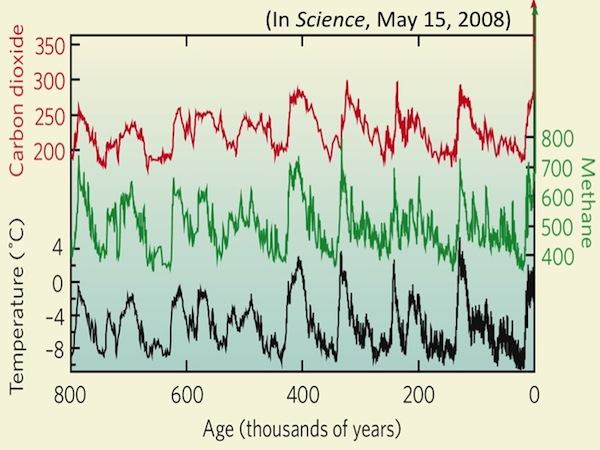The current political debate over whether climate change is caused by humans is worthless and moot, and it is distracting the American people from dealing with a problem that threatens our livelihood. As a former climate scientist at the Carnegie Institution of Washington, I must disclose that I am certain of the anthropogenic causes of climate change. That said, the causes of climate change are completely irrelevant when it comes to whether we should deal with it. As a society, are we spending our time trying to affix the blame, instead of fixing the problem.
There are three facts about climate change that are overwhelmingly undisputed by people of any creed or political affiliation. Interestingly, none of these facts have anything to do with who or what is causing climate change. They are:
1.Human activity puts 30 billion of tons of CO2 in the atmosphere every year (Source).
2.Atmospheric CO2 and temperature are related -- as CO2 goes up, so does temperature (see graph below)
3.Hotter is bad. It means less predicable climate and more extreme weather, and a myriad of other knock-on consequences that ultimately cost us a great deal of money, or worse.
Taken together, these facts implore us to act. The atmosphere contains roughly 3 trillion tons of CO2, which means we add about one percent of that amount to the air every year. When you consider that more CO2 means temperature is rising to our detriment, it seems obvious that we need to adjust our behavior.
Yet instead of working on solutions, we are mired in an ideological battle over whose fault it is, as if that were the determining factor of whether climate change is a problem to be dealt with or not. This is simple insanity. It's like driving down the freeway, and somehow you become aware that you are about to be in a head-on crash, but you say to yourself, 'I'm not going to put my seat belt on because it's the other guy's fault.'
The idiocy and ultimate tragedy of this flawed reasoning that action should be predicated on cause instead of threat is nowhere more apparent than in the race for the Republican Presidential nomination. Candidates' positions on climate change range from reasonable to ridiculous, but what I can't understand is why the most hotly contested point about climate change is also its most unimportant: who is causing it.
GOP candidate Mitt Romney was recently chided by famous climate skeptic Oklahoma Senator James Inhofe for waffling on the subject: "Do I think the world's getting hotter? Yeah, I don't know that, but I think that it is," [Romney] said.
"I don't know if it's mostly caused by humans," said Inhofe, who has endorsed fellow ardent climate change denier Texas Governor Rick Perry and is famous for saying climate change is the "greatest hoax ever perpetrated on the American people."
Our ability to feed 7 billion people, enjoy clean air and water, and produce economic activity (among many other things) depends on a stable and predictable climate and the services ecosystems provide, yet there seems to be a strong argument in political discourse that if we're not causing it, we shouldn't do anything about it.
Much of the political argument to not act on climate change centers on the economic damage that acting will do. Presumably, Republican candidates are engaging in this hollow dialogue in order to win over the far right of their party, a necessary constituency to earn nomination. However, with every day that passes, we see more and more costs of not acting. 2011 has already been one of the hottest and most weather-extreme of any year on record, and climatologists say 'get used to it,' because this is the way it's going to be in the future.
This article from the LA Times highlights just how tragically flawed and particularly ironic it is that politicians in two of the states most affected by climate change-induced calamity are the ones arguing most ardently that there is no problem, and even if there is, it's not our fault.
Take Inhofe himself. Oklahoma is in the midst of one of the worst tornado/heat/drought seasons ever endured. It makes me wonder: what must James Inhofe and Rick Perry think about the fact that all hell is breaking loose in their own states, causing death and destruction and billions in economic damage?
Regardless of who or what is causing it, the climate is changing, and prudence would dictate humanity do what is within its power to ensure its own livelihood. The direct data is clear, and the circumstantial evidence is frightening. Precaution tells us that if there's a problem, we should do what we can to mitigate it. Herein lies the most puzzling irony of all. The definition of the word conservative in Webster's dictionary reads "disposed to preserve existing conditions." When did not being conservative become the prevailing ideology of Conservative values?

Image obtained from Professor Rob Dunbar, Stanford University. W.M. Keck Professor of Earth Science, Stanford University